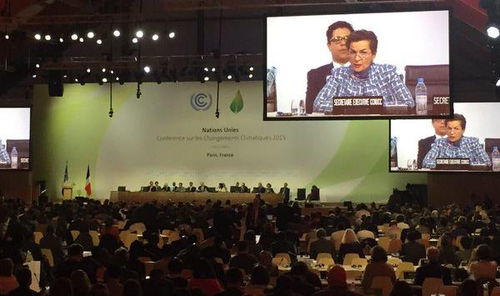A great deal has happened since world leaders gave their opening statements during the first day of the UN Climate Change Conference 2015, COP21 climate change talks. In the space between 30 Nov and 11 Dec 2015, the world witnessed heated talks and passionate pleas culminating into a historic international climate agreement signed in Paris on Saturday 12 Dec 2015.
The agreement recognises the potential threat of extreme climate change (above 2 degrees Celsius) and is designed to reduce greenhouse gas emissions and limit the average rise in global temperatures to 2 degrees Celsius above pre-industrial times.

Credit: UN Climate Change Conference 2015
The Paris Agreement and the outcomes of COP21 cover all the crucial areas identified as essential for a landmark conclusion: mitigation – reducing emissions fast enough to achieve the temperature goal; a transparency system and global stock-take – accounting for climate action; adaptation – strengthening ability of countries to deal with climate impacts; loss and damage – strengthening ability to recover from climate impacts; and support – including finance, for nations to build clean, resilient futures.
"History will remember this day… The Paris agreement on climate change is a monumental success for the planet and its people." said UN Secretary-General Ban Ki-moon.
IMPRESSIONS at the event
A number of side events were also included in the COP21 programme among which the Rio Conventions Pavilion (RCP) organized by the Secretariats of the Rio Conventions and the Global Environment Facility.
Each day at the RCP organizations provided a focus on a different theme relevant to climate change, sustainable land management and biodiversity in the context of sustainable development. IMPRESSIONS partner Dr. Mark Rounsevell took part in the RIO pavilion session on 10 December focused on "Synergies and trade-offs in land-based climate mitigation and biodiversity."
There is not enough land in the world to feed everyone what is considered a normal USA diet. Prof M. Rounsevell pic.twitter.com/4YXfF8GOG9
— Rio Pavilion (@RioPavilion) December 10, 2015
Other themes included: exploring land’s role in mitigating climate change; the role of biodiversity in combating climate change; recognising the successes of indigenous peoples and local communities’ initiatives in building climate resilience; the impact of climate change on our oceans; the role of business in addressing climate change; the potential of forests in climate change mitigation; climate-informed development; the benefits of gender-sensitive approaches in adaptation and mitigation efforts.